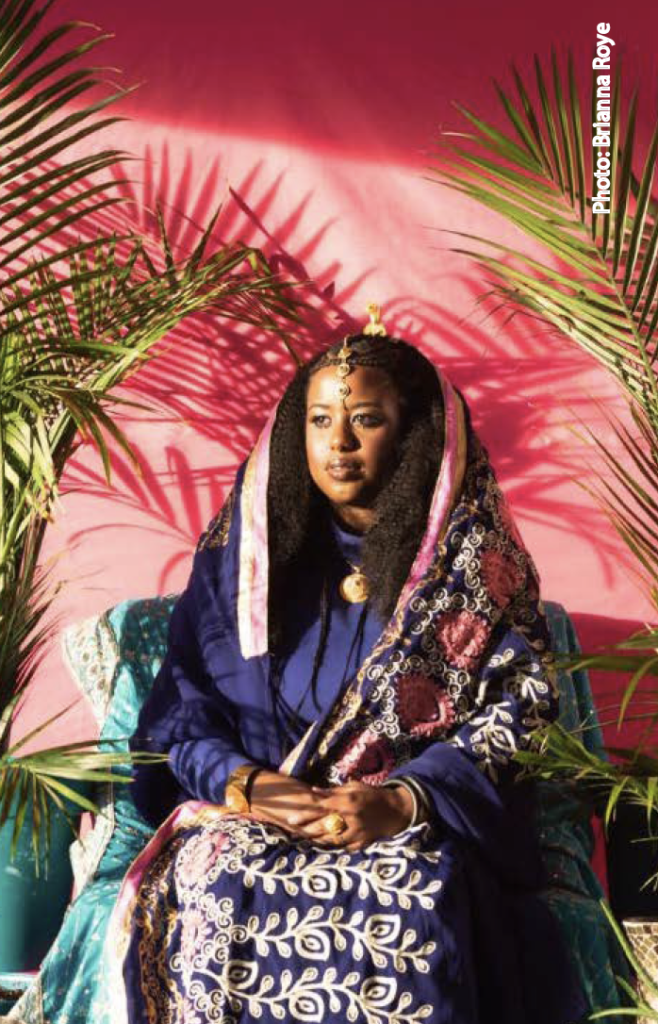“The city’s loud,
but you can be louder in the country.”
-Ayo Leilani of Witch Prophet
Things have gotten a lot louder in the countryside since the band Witch Prophet moved into a 4,000 square foot farm in Caledon, Ontario, where they have been reinventing it into an artist residency, venue, and studio rehearsal space.
The move has been positive for both their personal and professional lives which have blossomed since immersing themselves in acres of forest and farmland. Led by Toronto based Ethiopian/Eritrean singer-songwriter Ayo Leilani, and her partner Sun Sun, Witch Prophet takes listeners on a cerebral and airy journey that’s as magical as their relationship sounds. During a recent interview with Ayo she elaborated on how country living is impacting their creative projects, “It’s allowed us to focus on what we really want to do without the noise from the city distracting us. Living on the farm has brought a peace that I didn’t realize I needed, and my body was craving. The country is great for when you need to sit down and work on things more in-depth, and because there is no sound limit you can blast the music as loud as you want and not worry about the neighbours,” she explains.
Using her surroundings as spiritual inspiration, Ayo is harnessing the creative and spiritual energies around her and transforming it into new works. “I’m spiritual in the sense that I believe in spirits and I do believe in a higher power. I just don’t know what that is exactly. I believe that tapping into the unknown realms is where my music comes from, that it is a gift from above. The lyrics that come out from me could be understood as Christian messages, but I’m not Christian. I just believe in the power that the energy you put out will come back to you, and energy is a real thing, It’s a scientific fact, so it’s not a wish or a dream, this is a physical thing. It can be seen, you can use it for good or for bad. So I try and use the energy that I have to send whatever message is supposed to be sent into this world, and usually that comes with meditation, burning incense, and praying.”

Mixing business and their romantic relationship has also enabled them to use the countryside as a studio to create, develop, and produce work on their own terms. Their most recent album, The Golden Octave, layers seemingly disparate elements with rich harmonies, smart beats, and vocal samples to create sound experiences that elevate the storytelling process. The album contains collaborations with ultra-queer Rosina Kazi, Polaris Music Prize winner Lido Pimieta and Toronto legend Lucas Silveira (The Cliks), who Ayo was introduced to through a friend at the Toronto Arts Council. “I had written the song, Listen, which was inspired by a friend of mine who was dealing with suicidal thoughts and mental health issues. So I just wrote Lucas and asked if he’d be interested in collaborating,” she says. What began as a creative collaboration on a music track has evolved into a meaningful friendship for the both of them. “Since then we’ve helped each other with music, spiritual, and health advice.”
The Golden Octave is so perfectly balanced that it begs the question, how can they top this? With their Ontario Arts Council funded sophomore album, DNA Activation, releasing this spring, we’ll soon find out. The new album promises to be a deeply personal work for Ayo, an ode to her Ethiopian/Eritrean roots. “Every song is named after a family member. It’s really a very personal album, especially since I’m not just singing in English. I want to be able to connect more deeply with my community, so it’s a very vulnerable album for me. Just like with any culture where you don’t speak the language fluently, there will always be someone judging you for being a child of the diaspora.”
Witch Prophet’s musical journey is not unlike artists such as Tegan and Sara who have been navigating the industry primarily on their own, and self-producing in a largely straight, male-dominated industry, yet making it big. So how are they doing it? After-all, self-producing is hard work, and then add being a queer artist to the mix, and things are all the more challenging. As Ayo explains, “It’s also a challenge for people to see me as a queer artist when I’m also a black African woman. That also comes with a lot of misconceptions about who is allowed to be part of queer culture and who isn’t.”
Defining success on one’s own terms may be an uphill battle, but as Ayo is quick to point out, it has come with life lessons that have ultimately shaped their career. “I now know all the steps that it takes to make it in the music industry, and it takes more than one or two posts online. I wish someone had told me that a lot of the people who I think are independent artists actually aren’t, and have a team behind them. It will probably take ten years to break through as an independent artist, but now I understand the actual process of doing an album.”
witchprophet.com
Originally published in theBUZZ Magazine, February 2020
